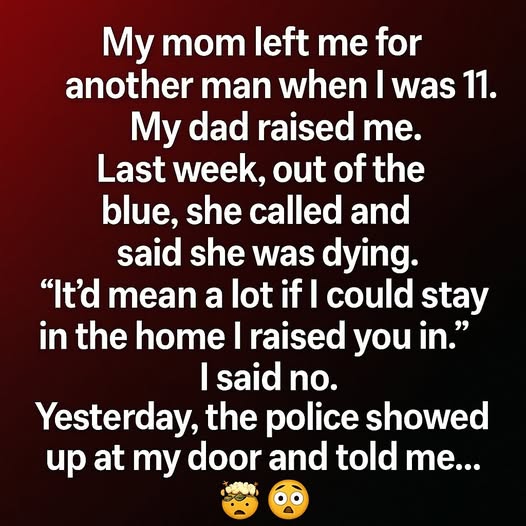When I was eleven years old, my world tilted off its axis. My mother left our family for another man. At that age, you don’t fully understand betrayal—you just feel it. One day she was there, brushing my hair, packing my lunches, and humming absentmindedly as she cleaned the kitchen. The next, she was gone, leaving behind a silence in our home that nothing seemed to fill.
What surprised me most wasn’t her absence, but the way my father filled the void she left behind. He wasn’t perfect. He burned dinners more often than not, struggled with ponytails and braids, and his attempts at comforting words sometimes came out clumsy. But he showed up. Every parent-teacher conference, every soccer game, every night when the questions about “why Mom left” were too heavy for a child to carry alone—he was there. His presence became the glue that held my world together.
Years passed, and my mother remained a shadow in the background. I occasionally heard about her from relatives, but I never saw her. I told myself I was fine without her. That I didn’t need her. And for the most part, I believed it.
Then, last week, my phone rang. I recognized her voice instantly, though it sounded frailer than I remembered. Time had etched weakness into her tone. She didn’t waste time on small talk.
“I’m very sick,” she said quietly. “I don’t have much time. It would mean a lot if I could come back. If I could stay in the home I raised you in.”
Her words hit me like ice water. The home she raised me in? That wasn’t true. She had left when I was still a child. The memories that made that house feel like a home weren’t hers. They were my father’s. The walls echoed with his laughter, his sacrifices, his endless effort to make up for everything she took when she walked away.
I thought about the double shifts he worked to keep food on the table. About the nights he stayed up with me when I was sick. About the way he once sat in front of YouTube tutorials for hours just to learn how to braid my hair for picture day. He didn’t always get it right, but he always tried. That mattered more than perfection ever could.
So I told her no. I told her she couldn’t come back.
A day later, I got another knock on my door—this time from the police. They told me she had passed away.
For a moment, everything went quiet. Not because of shock. Truthfully, I had lost her a long time ago. But there was a different kind of weight in hearing those words. Her death closed the door on something I hadn’t admitted I was still waiting for: the possibility of reconciliation.
There would be no apologies, no explanations, no chance to hear her say she was sorry for leaving. There would be no chance to ask the questions that lingered in my heart for decades. The finality of death isn’t just about losing someone—it’s about losing every opportunity you thought you might still have.
That night, I sat with my dad. We didn’t say much. We didn’t need to. The silence was comfortable, familiar. He knew what I was feeling, and I knew he understood without words.
As I looked at him, I realized something profound: while my mother’s absence left scars, my father’s presence built my foundation. The house my mother wanted to return to was never truly hers. It was his. He was the one who made it safe, warm, and filled with love.
And that’s when I understood something about family that I wish I had known sooner. Family isn’t just about the people who bring you into this world. It’s about the people who stay. The ones who sacrifice, who show up, who keep trying even when it’s hard. The ones who may not always get it right, but never stop showing up anyway.
My father didn’t give me perfection. He gave me stability, love, and proof that you don’t have to be flawless to be a good parent. You just have to stay.
In the days since my mother’s passing, people have asked if I regret not letting her come back. The truth is complicated. A part of me wishes I had said yes, if only to give her comfort in her final days. But a bigger part of me knows that opening that door would have meant rewriting the truth of my childhood—and the truth is, she wasn’t there. My father was.
Sometimes forgiveness isn’t about letting someone back in. Sometimes it’s about accepting what they chose and deciding to move forward without them. My mother chose to leave. My father chose to stay. And in the end, that made all the difference in the person I became.
Her goodbye didn’t teach me about loss—it taught me about gratitude. Gratitude for the man who didn’t walk away. Gratitude for the sacrifices he made quietly, without ever demanding thanks. Gratitude for the love he gave so consistently that it became the foundation of my life.
If there’s one lesson I’ve learned, it’s this: biology may connect us, but love sustains us. The people who raise us aren’t always the ones who brought us into the world. Sometimes, they’re the ones who step up when someone else steps down.
My mother’s absence taught me pain. But my father’s presence taught me love. And in the end, love is what mattered most.
